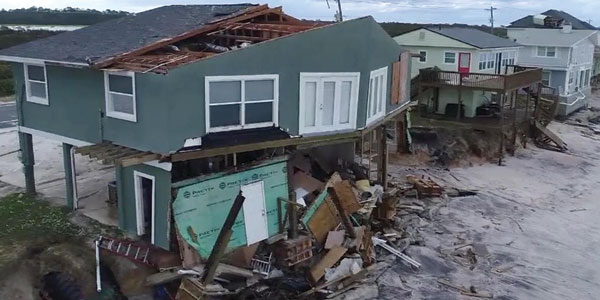
MIAMI, Fla. — I’m writing this with a pen on moist yellow paper. It’s been a few days since there was electricity in my home; there is no internet, and no connection with the rest of the world. The screen on my phone says “No Service.” My cold morning shower left me shivering. By contrast, I’ve been spending nights sweating until daybreak, since opening a window would expose me to a brutal mosquito attack. I’ve been reading by candlelight. I had some bread for dinner.
There’s nothing like a hurricane to remind us of how tiny we really are.
Since Hurricane Irma came to Florida earlier this month, nothing has been normal. Some parts of Miami remain impassable; the fallen trees are a consistent obstacle and a test of patience. Endless, winding lines at gas stations, supermarkets and hardware stores are enough to bring back painful memories for immigrants who have left Venezuela. At darkened traffic lights, the rule of kindness is in effect with regard to which car should go first. That, or the rule of who has the largest SUV.
I don’t recognize the city in which I live. And the worst part is that it will take a long while for it to go back to normal. I was also here after Hurricane Andrew in 1992, and I know that recovering after such a disaster takes not weeks or months but years.
Miami is located in a very vulnerable area. And while Hurricane Irma hardly touched us, it seems to have upended everything. Brickell Avenue became a river, Coral Gables now resembles a tousled jungle and you can see lines of boats, piled like toppled dominoes, in Coconut Grove.
This is what happens when we insist on living by the sea. Yet despite the disruption and risk, scores of apartment buildings are still going up, defiantly, on Biscayne Bay. Global warming is not a hoax (as the noted scientist Donald Trump once asserted): Besides the danger posed by stronger and more unpredictable storms, sea temperatures are rising and the poles are melting. All that water has to go somewhere. Eventually, the sea will win.
I have a feeling that at some point real estate prices in Florida will plummet. Who wants to live in a place where your house might flood at any time, or your roof could be torn off by the wind every year?
While Irma neared, as in a horror movie, Miami residents fled north — to Naples, Tampa and Jacksonville — but those cities were eventually hit by the storm as well. I saw a satellite picture of Irma covering the entire Florida Peninsula. Nobody could escape.
However, hours after Irma passed, a second army came out and was ready to remove rubble and set things right — the immigrant army, that is. Suddenly, gardeners and laborers were the most sought-after workers in the state. Immigrant hands will rebuild Florida.
Of course, today’s Floridians aren’t the first to fall for the beauty of the region. Juan Ponce de León claimed this land for Spain in 1513, and it is here that the myth of a spring that made old men young again originated.
But the beauty of Florida hides huge perils. The Atlantic Ocean and the Gulf of Mexico are claiming back beaches, streets and homes. And how long can cities withstand 150 mph winds and 10-foot storm surges?
Three days after Irma hit Florida, I went south to Big Pine Key. The eye of the hurricane had passed nearby. The road was covered with seaweed, and a nearby RV park looked like Lego pieces that had been kicked around. Nothing there will be the same again, not even after the caravans are standing on their wheels again.
Once the cellular network is back, and my garden looks like a garden again, and the lights come back on, and the internet can be accessed by a click, and I can fall asleep without sweating or worrying about mosquitoes, everything will be back to normal. Or will it?
I wonder whether we will be able to forget about all of this. Maybe we will tuck it away in the dark corners of our minds where we store uncomfortable memories. Maybe we will put it behind us, at least until the next hurricane season arrives, when I will read a tweet saying a tropical depression has formed on the coast of Africa and a bead of sweat forms on my forehead.
Nada Es Normal
MIAMI — Escribo esto con pluma sobre un papel amarillo y humedecido. Hace días que no hay electricidad en mi casa y, por lo tanto, tampoco hay internet ni teléfono ni ningún otro tipo de contacto con el resto del mundo. En lugar de rayitas, mi celular dice “No Service.” Los regaderazos matutinos me dejan temblando por el agua extrañamente fría y me paso las noches leyendo a la luz de una vela y sudando hasta el amanecer. Abrir la ventana me dejaría expuesto a un brutal ataque de mosquitos. Mi postre anoche fue un pan tibio que me supo a … pan tibio.
No hay nada como un huracán para recordarnos lo pequeñitos que somos.
Nada es normal después de un huracán. Hay partes de Miami intransitables. Los árboles caídos son una constante prueba de obstáculos y paciencia. Las laberínticas filas en las gasolineras, supermercados y ferreterías les traen malos recuerdos a los que acaban de dejar Venezuela. Sin semáforos, a veces reina la amabilidad y otras la ley de la camioneta más grande.
Desconozco el lugar donde vivo, y lo peor es que va para largo. También estuve aquí tras el paso del huracán Andrew en 1992 y sé que recuperarse de un desastre así toma años, no semanas ni meses.
Miami es una ciudad muy vulnerable. El huracán Irma, disminuido a categoría tres, apenas nos rozó y, aún así, lo trastocó todo. La avenida Brickell se volvió río, Coral Gables parecía una selva despeinada y la marina de Coconut Grove se transformó en un dominó de botes.
Esto es lo que pasa cuando insistimos en vivir junto al mar. Apartamentos en construcción se siguen amontonando pegaditos a la bahía de Biscayne, entre desafiantes y tontos. Pero el calentamiento global no es un invento chino, como alguna vez aseguró el científico Donald Trump. Los océanos suben de temperatura, los polos se derriten y esa agua se tiene que ir a algún lado. Al final, el mar va a ganar.
Sospecho que pronto los precios de las propiedades en la Florida se van a caer. ¿Quién quiere vivir en un lugar donde una vez al año se te puede inundar la casa y tu techo puede salir volando?
Hay otras ciudades que también se podría comer el mar. Como película de horror, los miamenses que huyeron al norte — a Naples, Tampa y Jacksonville — fueron alcanzados por la tormenta horas después. Vi una foto satelital en la que se veía a Irma cubriendo toda la península de Florida. Nadie pudo escapar.
Sólo unas cuantas horas después de que Irma tocó tierra, salió ese segundo ejército de Estados Unidos — el de los inmigrantes — listo para recoger los escombros y poner las cosas en su lugar. Los jardineros, de pronto, se convirtieron en los trabajadores más buscados del estado. Sí, manos inmigrantes son las que van a reconstruir Florida.
No somos los primeros en caer rendidos ante la belleza de la Florida. Juan Ponce de León reclamó el territorio para España en 1513. Aquí surgió el mito del manantial que transformaba en jóvenes a los viejos.
Sin embargo, la belleza de Florida esconde enormes peligros. Nosotros, en Miami, tenemos el océano Atlántico y el golfo de México reclamando playas, calles y casas. ¿Quién aguanta vientos superiores a las 150 millas por hora y una marejada ciclónica de la altura de dos personas?
Tres días después del paso de Irma me fui a Big Pine Key, casi en la punta sur de Estados Unidos. El ojo del huracán pasó cerca de aquí. Algas cubrían la carretera y el sol, castigador, decía yo no fui.
Un “trailer park” quedó como un castillo de Lego tras ser pateado por un niño. Aquí ya nada será igual, aunque vuelvan a ponerse en pie los “campers” que se voltearon.
Cuando vuelva la señal del celular, mi jardín de nuevo parezca un jardín, regrese la electricidad, el internet me llegue con un clic, me duerma sin sudar y sin mosquitos, y mi postre no sea un pan tibio, entonces todo será normal. ¿Será?
Me pregunto si todo esto se nos va a olvidar. Quizás lo vamos a poner en uno de esos rincones mentales donde almacenamos las cosas incómodas. Hasta que la próxima semana o la siguiente temporada de huracanes me llegue un tuit diciendo que se ha formado una depresión tropical frente a las costas de Africa y sienta una gota de sudor en la frente.
(Jorge Ramos, periodista ganador del Emmy, es el principal director de noticias de Univision Network. Ramos, nacido en México, es autor de nueve libros de grandes ventas, el más reciente de los cuales es “A Country for All: An Immigrant Manifesto.”)









